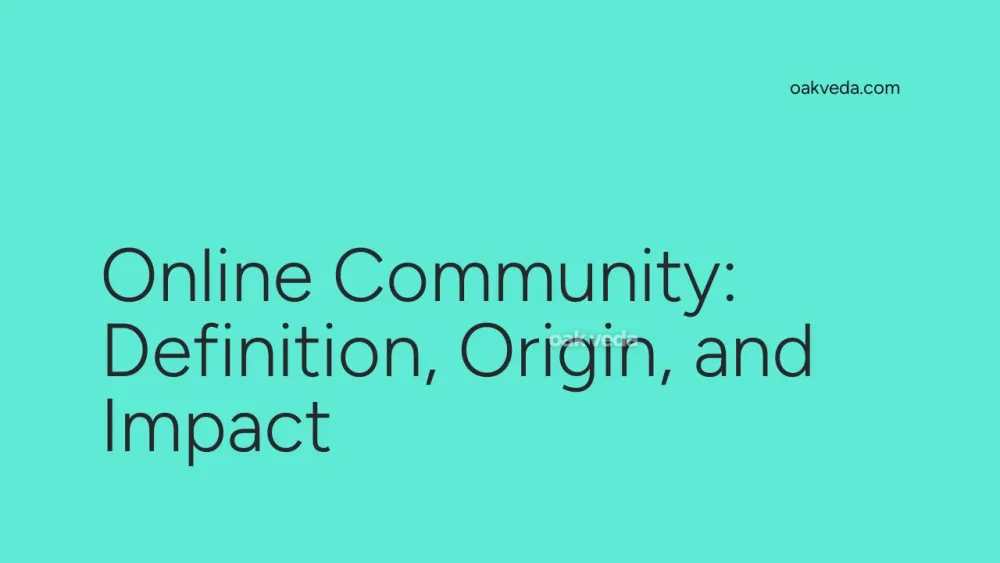
What is an Online Community?
An online community is a virtual gathering of individuals who interact and engage with one another through digital platforms, websites, or social media channels. These communities are formed around shared interests, goals, or affiliations, providing a digital space for people to connect, collaborate, and communicate regardless of geographical boundaries.
Origin and Development of Online Communities
The concept of online communities dates back to the early days of the internet. In the 1970s and 1980s, bulletin board systems (BBS) and Usenet newsgroups laid the foundation for digital interaction. As the internet evolved, so did online communities, with the emergence of web forums, chat rooms, and social networking sites in the late 1990s and early 2000s.
The rise of social media platforms like Facebook, Twitter, and Reddit in the mid-2000s further revolutionized online communities, making them more accessible and diverse than ever before.
How Online Communities Work
Online communities function through various digital platforms that enable members to:
- Engage in discussions
- Share content and experiences
- Seek and offer advice
- Collaborate on projects
- Provide emotional support
These interactions are typically facilitated through features such as forums, comment sections, direct messaging, and content sharing tools. Many online communities also have moderators or administrators who help maintain a positive and productive environment.
Types of Online Communities
- Interest-based communities: Centered around hobbies, passions, or specific topics (e.g., photography, gaming, cooking)
- Professional networks: Focused on career development and industry-specific discussions (e.g., LinkedIn groups)
- Support groups: Providing emotional support and resources for individuals facing similar challenges
- Brand communities: Gathering customers and fans of specific products or companies
- Learning communities: Dedicated to education and skill development
- Social networking communities: Broad platforms for general social interaction and connection
Popular Examples of Online Communities
- Reddit: A vast network of user-created communities (subreddits) covering countless topics
- Stack Exchange: A group of Q&A websites for various fields, including programming and science
- Goodreads: An online community for book lovers to discuss and review literature
- DeviantArt: A platform for artists to share and discuss their work
- Mumsnet: A community for parents to share advice and experiences
Impact of Online Communities on Social Media Culture
Online communities have significantly shaped social media culture by:
- Fostering global connections: Enabling people to form relationships across geographical boundaries
- Democratizing information: Providing platforms for knowledge sharing and collaborative learning
- Influencing consumer behavior: Offering spaces for product reviews, recommendations, and brand discussions
- Driving social movements: Facilitating organization and mobilization around social and political causes
- Redefining identity and belonging: Allowing individuals to explore and express various aspects of their identities
Controversies and Debates Surrounding Online Communities
While online communities offer numerous benefits, they also face challenges:
- Echo chambers: The tendency for like-minded individuals to reinforce each other's views, potentially leading to polarization
- Misinformation: The rapid spread of false or misleading information within communities
- Cyberbullying and harassment: The potential for negative interactions and abuse in online spaces
- Privacy concerns: Issues surrounding data collection and user privacy within community platforms
- Addiction and mental health: The impact of excessive online community engagement on well-being
How Brands and Influencers Use Online Communities
Brands and influencers leverage online communities to:
- Build brand loyalty: Fostering connections with customers through dedicated brand communities
- Gather feedback: Obtaining insights directly from community members to improve products or services
- Provide customer support: Offering assistance and resolving issues within community spaces
- Collaborate with influencers: Partnering with community leaders to reach target audiences
- Drive user-generated content: Encouraging community members to create and share brand-related content
Future Trends Related to Online Communities
As technology evolves, online communities are likely to see several developments:
- Virtual and augmented reality integration: Creating more immersive community experiences
- AI-powered moderation: Improving community management through advanced algorithms
- Decentralized communities: The rise of blockchain-based platforms for community governance
- Niche micro-communities: Increased specialization and fragmentation of online groups
- Cross-platform integration: Seamless community experiences across multiple digital channels
FAQs about Online Communities
-
How do I find the right online community for me? Research communities related to your interests, read their guidelines, and observe interactions before actively participating.
-
Are online communities safe? While many communities have safety measures in place, it's essential to be cautious about sharing personal information and to report any abusive behavior.
-
Can online communities replace real-life social interactions? While online communities offer valuable connections, they should complement rather than replace in-person interactions for a balanced social life.
-
How can I contribute positively to an online community? Engage respectfully, share valuable content, help others, and follow community guidelines to be a positive member.
-
What skills can I develop through participating in online communities? Active participation can improve communication, networking, digital literacy, and collaborative skills.
Online communities have become an integral part of our digital lives, offering unprecedented opportunities for connection, learning, and growth. As technology continues to advance, these virtual spaces will likely play an even more significant role in shaping our social interactions and cultural landscape.
You may be interested in:
- Webinar: Definition, Origin, and Impact on Digital Communication
- Gucci: Definition, Origin, and Impact in Social Media Slang
- Lemon8: Definition, Origin, and Impact on Social Media
- KPIs in Social Media: Definition, Origin, and Impact
- Roman Empire Trend: Definition, Origin, and Impact
- Valid: Definition, Origin, and Impact on Social Media

